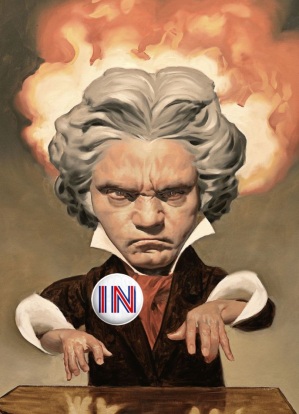
Beethoven’s Ode to Joy – the climax of his ninth symphony – has one of the strangest histories in music. Since its premiere in 1824, it’s been used by everyone from French socialists to Nazis, Tiananmen Square protesters to racists (it was Rhodesia’s anthem in the 1970s before the country became Zimbabwe).
But this week, as the UK’s Brexit referendum occurs, it needs to be highlighted for one particular part of its history: for being the anthem of the European Union.
Why did the EU choose Ode to Joy? Largely because of one man: Paul Lévy, a Belgian Holocaust survivor who in 1962 was director of information at the Council of Europe, one of the EU’s many forerunner.
That year, Lévy found himself being deluged with songs from seemingly every amateur songwriter in Europe desperately hoping to give the continent its theme tune. “Some aren’t bad,” he wrote to a colleague. “Others would make a bald man’s hair stand on end.”
All those submissions made him realise one thing: that Europe couldn’t have some unknown’s “anodyne, simple little tune” as its anthem. How would that inspire anyone? It needed a great work instead: a true example of European achievement; one that could uplift anyone’s soul. At the top of his list: Ode to Joy.
The Council adopted it a few years later; the EU a few years after that. Weirdly they both decided to commission a former Nazi to do the arrangement, the conductor Herbert von Karajan. Hardly the best start.
They also decided to remove the words believing, probably rightly, that no one except Germans would sing in German. Although that probably doomed the anthem from the outset. How can people sing a song without words?
Clearly, Ode to Joy hasn’t worked as the EU’s anthem. It hasn’t brought the continent together one bit.
The EU’s own surveys suggest only a third of Europeans even realise the bloc has an anthem. I assume even fewer know it’s Ode to Joy. Some probably think it’s the Champions League theme (“The champions!”).
But regardless, I’m pretty sure Beethoven would be proud to have the title. He wrote his ninth symphony to Joy at a time when Europe was anything but unifed, yet he chose to include in it a poem that literally calls for “all men to become brothers”.
He even added some of his own words to the start that seem to be calling people to move beyond nationalism: “Oh friends, not these sounds. Let us instead strike up more pleasant and more joyful ones.”
You could argue that he would have hated the EU. Beethoven wrote plenty of pieces of patriotic music for Austria and he also seemed happy to stoke nationalist feelings across Europe during his career. In 1803, for instance, he wrote seven variations on God Save the Queen. A decade later, he included both that anthem and Rule Britannia in his appalling Battle Symphony – a 14-minute crowd pleaser seemingly written solely to get the money rolling in from England.
But with Ode to Joy, his feelings are clear. Listening to it is rather like hearing a hippy strumming a guitar; the sound of someone who has smoked a bit too much dope and decided he can change the world with a song.
Given that, I’m pretty sure if he were alive now, he’d be campaigning for Britain to be remain in Europe. Although perhaps he wouldn’t like what some people have done to his tune around the vote:
